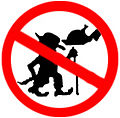aNewDomain.net — What kind of rules should govern the web and who will decide what those rules are? The debate rages in the post-Snowden era, especially as the 25th anniversary of the World Wide Web just passed. Will the wisdom of the crowds cast the votes, or will a hybrid corporate-government coalition dictate the rules?
This week the Obama administration decided to relinquish oversight over ICANN, the international group that manages the back-end of the Internet. Post-Snowden, there are powerful international voices rising against the dominance of the USA on global Internet issues. This time, perhaps, the USA is finally listening.
Sir Berners-Lee, the inventor of the World Wide Web, decided to start a global initiative highlighting his concern. He calls for ideas from the global Internet community towards a freer web. The big question is will the social-global-collective brain be able to agree on the applicable principles, as suggested below.
Web Rights and the Web We Want
Many have called for an overhaul of how the web is governed. A.S. Panneerselvan from India writes:
Existing governance arrangements for the global Internet suffer from a lack of democracy; an absence of legitimacy, accountability and transparency; excessive corporate influence and regulatory capture; and too few opportunities for effective participation by people, especially from developing countries.”
Lee’s organization, aptly named the Web We Want, issued this as its mission statement:
On 12 March, the Web’s 25th birthday, close to half a billion people around the world heard Web inventor Tim Berners-Lee’s call for a digital bill of rights in every country. Hundreds of thousands of people answered with tweets and messages of support! To follow up on the massive response to Tim’s call, the Web We Want campaign is launching a 25th Anniversary Year of Action from March 2014 to April 2015. Let’s demand our rights to a web that is open, free and secure for everyone.”

Image credit: The Web We Want
The group laid out some basic tenets of the web it wants:
- Affordable access to a universally-available communications platform
- The protection of personal user information and the right to communicate in private
- Freedom of expression online and offline
- Diverse, decentralized and open infrastructure
- Neutral networks that don’t discriminate against content or user
The Big Question
The main issue with Tim’s request, and with many of the pro-change movements, is what exactly should be done? Everyone has an opinion, and each has a slightly different vision.
What is your take on privacy or anonymity in the age of Big Data? In this post-Snowden period, all Internet users have higher awareness about the powers lurking on the net.
Consider the notion of “anonymity.” Some, such as the Electronic Frontier Foundation (EFF), argue that anonymity is crucial for freedom of communication (just as privacy can be essential for freedom of association). Others, such as myself, argue that “trolls” ought to be held accountable for threatening or offensive comments. You may have different positions on anonymity depending on whether you are expressing a political view online, or being subjected to vitriol. Everything is relative.

Image credit: Wikimedia Commons
Two lecturers from NSW University in Sydney argue that:
The difficulty Sir Tim’s proposal faces is that there can be no single vision of the ‘web we want.’ This is true within internally diverse countries such as the UK and Australia and is certainly true among the wider international community. At most, there might be the ‘web the majority of people wants at a given time’ but to work out what that is requires more than a debate among those who self-select to join Sir Tim’s campaign. Sir Tim calls for an ‘open, neutral‘ web. It is hard to disagree – who would want the world wide web to be closed or biased?”
So, what kind of web do you want? We all have a voice, and pretty much all of us use the web. Let me know in the comments below. See one infographic-based vision below — and remember, the devil (as always) will be in the details. Here, anonymity is not mentioned.
For aNewDomain.net, I’m David Michaelis.
Based in Australia, David Michaelis is a world-renowned international journalist and founder of Link Tv. At aNewDomain.net, he covers the global beat, focusing on politics and other international topics of note for our readers in a variety of forums. Email him at DavidMc@aNewDomain.net.

Credit: http://domain.me/the-declaration-of-internet-freedom-will-you-fight-for-your-right-to-privacy/













